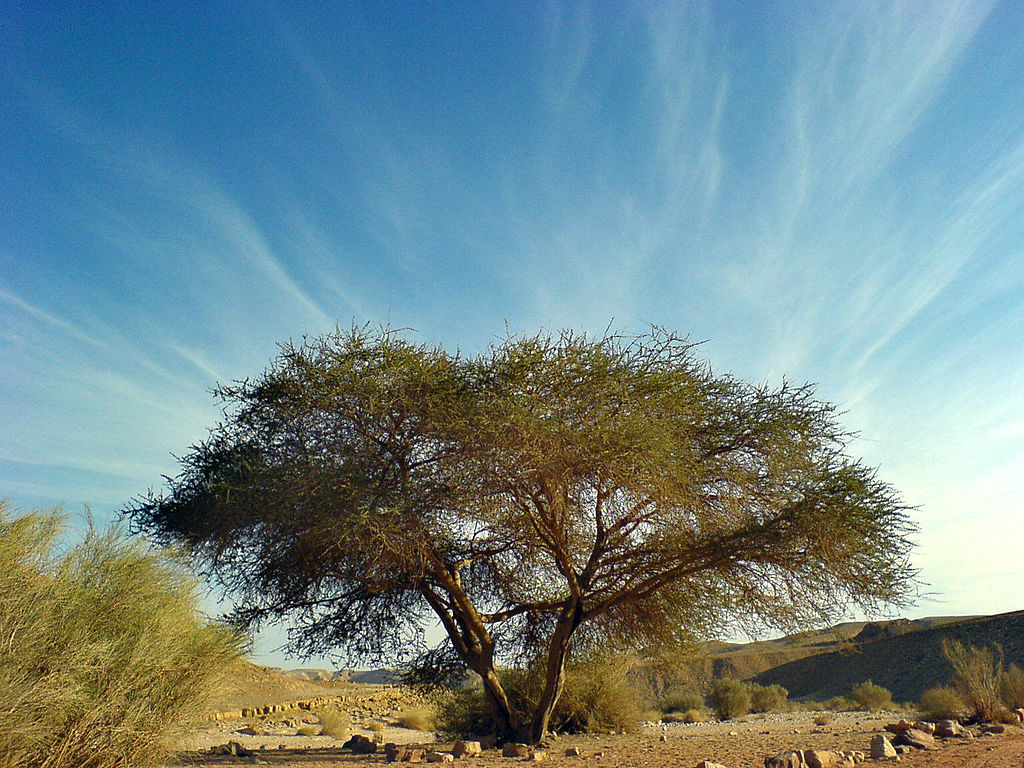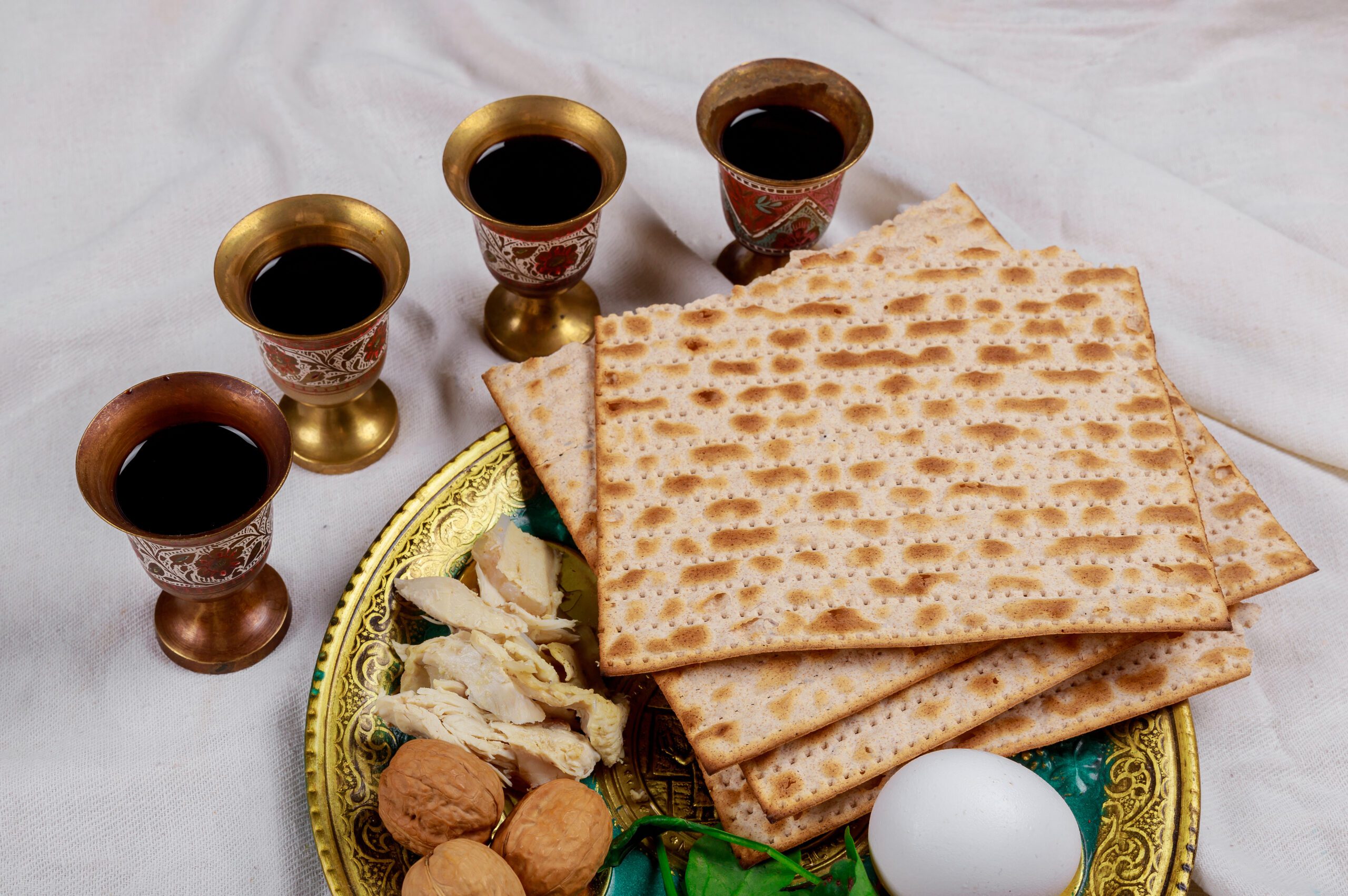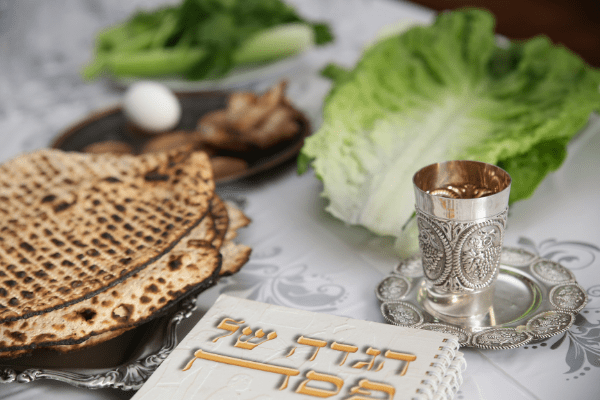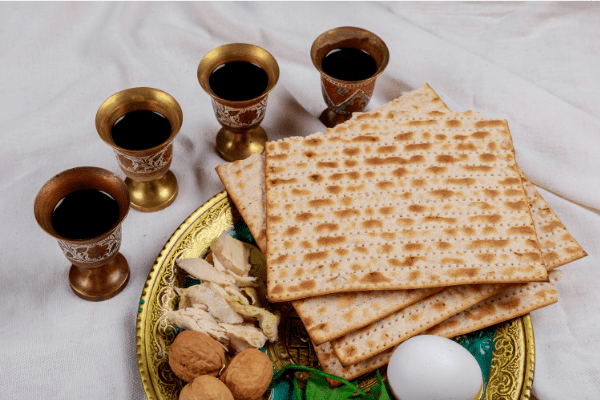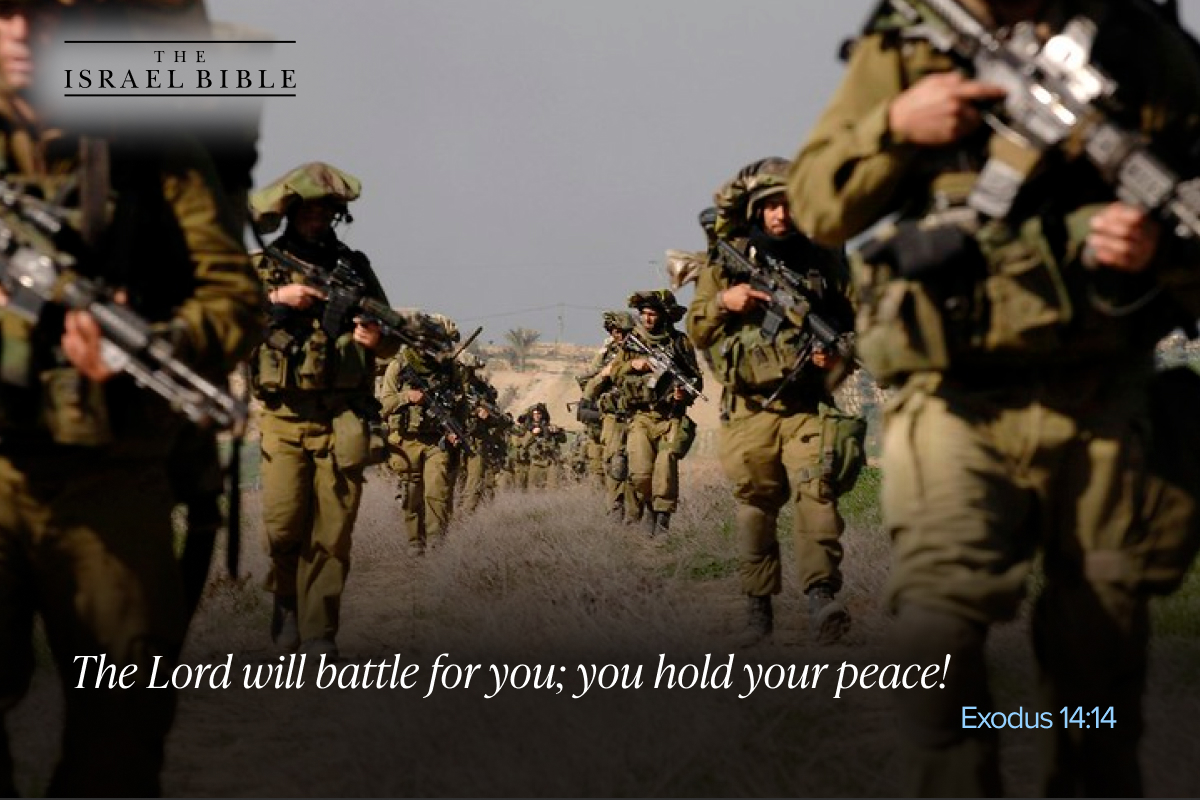
TORAH
NEVI'IM
KETUVIM
Chapter 6
Translation and Transliteration of
Listen to this chapter in Hebrew:
- Commentary
- Buy E-book
- Buy the Israel Bible
1Then Hashem said to Moshe, “You shall soon see what I will do to Pharaoh: he shall let them go because of a greater might; indeed, because of a greater might he shall drive them from his land.”
אוַיֹּאמֶר יְהֹוָה אֶל־מֹשֶׁה עַתָּה תִרְאֶה אֲשֶׁר אֶעֱשֶׂה לְפַרְעֹה כִּי בְיָד חֲזָקָה יְשַׁלְּחֵם וּבְיָד חֲזָקָה יְגָרְשֵׁם מֵאַרְצוֹ׃
2Hashem spoke to Moshe and said to him, “I am Hashem.
בוַיְדַבֵּר אֱלֹהִים אֶל־מֹשֶׁה וַיֹּאמֶר אֵלָיו אֲנִי יְהֹוָה׃
3I appeared to Avraham, Yitzchak, and Yaakov as El Shaddai, but I did not make Myself known to them by My name Hashem
גוָאֵרָא אֶל־אַבְרָהָם אֶל־יִצְחָק וְאֶל־יַעֲקֹב בְּאֵל שַׁדָּי וּשְׁמִי יְהֹוָה לֹא נוֹדַעְתִּי לָהֶם׃
4I also established My covenant with them, to give them the land of Canaan, the land in which they lived as sojourners.
v'-GAM ha-ki-MO-tee et b'-ree-TEE i-TAM la-TAYT la-HEM et E-retz k'-NA-an AYT E-retz m'-gu-ray-HEM a-sher GA-ru VAH
דוְגַם הֲקִמֹתִי אֶת־בְּרִיתִי אִתָּם לָתֵת לָהֶם אֶת־אֶרֶץ כְּנָעַן אֵת אֶרֶץ מְגֻרֵיהֶם אֲשֶׁר־גָּרוּ בָהּ׃
5I have now heard the moaning of the Israelites because the Egyptians are holding them in bondage, and I have remembered My covenant.
הוְגַם אֲנִי שָׁמַעְתִּי אֶת־נַאֲקַת בְּנֵי יִשְׂרָאֵל אֲשֶׁר מִצְרַיִם מַעֲבִדִים אֹתָם וָאֶזְכֹּר אֶת־בְּרִיתִי׃
6Say, therefore, to B'nei Yisrael: I am Hashem. I will free you from the labors of the Egyptians and deliver you from their bondage. I will redeem you with an outstretched arm and through extraordinary chastisements.
ולָכֵן אֱמֹר לִבְנֵי־יִשְׂרָאֵל אֲנִי יְהֹוָה וְהוֹצֵאתִי אֶתְכֶם מִתַּחַת סִבְלֹת מִצְרַיִם וְהִצַּלְתִּי אֶתְכֶם מֵעֲבֹדָתָם וְגָאַלְתִּי אֶתְכֶם בִּזְרוֹעַ נְטוּיָה וּבִשְׁפָטִים גְּדֹלִים׃
7And I will take you to be My people, and I will be your God. And you shall know that I, Hashem, am your God who freed you from the labors of the Egyptians.
זוְלָקַחְתִּי אֶתְכֶם לִי לְעָם וְהָיִיתִי לָכֶם לֵאלֹהִים וִידַעְתֶּם כִּי אֲנִי יְהֹוָה אֱלֹהֵיכֶם הַמּוֹצִיא אֶתְכֶם מִתַּחַת סִבְלוֹת מִצְרָיִם׃
8I will bring you into the land which I swore to give to Avraham, Yitzchak, and Yaakov, and I will give it to you for a possession, I Hashem.”
v'-hay-vay-TEE et-KHEM el ha-A-retz a-SHER na-SA-tee et ya-DEE la-TAYT o-TAH l'-av-ra-HAM l'-yitz-KHAK ul-ya-a-KOV v'-na-ta-TEE o-TAH la-KHEM mo-ra-SHAH a-NEE a-do-NAI
חוְהֵבֵאתִי אֶתְכֶם אֶל־הָאָרֶץ אֲשֶׁר נָשָׂאתִי אֶת־יָדִי לָתֵת אֹתָהּ לְאַבְרָהָם לְיִצְחָק וּלְיַעֲקֹב וְנָתַתִּי אֹתָהּ לָכֶם מוֹרָשָׁה אֲנִי יְהֹוָה׃
![]() 6:8 I will bring you into the land
6:8 I will bring you into the land
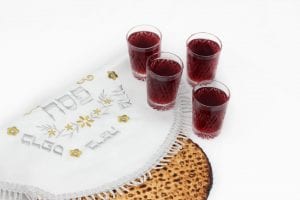
Four cups of wine for the Pesach seder
Four cups of wine are drunk at the Passover Seder, corresponding to the four expressions of redemption used in this verse to describe the exodus from Egypt: “Free,” “deliver,” “redeem,” and “take” (verses 6-8). A close reading of this chapter, however, uncovers that there is a fifth expression, “I will bring you,” found in the following verse. Why, then, do we not have five cups of wine at the Seder? The Talmud (Pesachim 118) explain that while the first four expressions of redemption from Egypt have in fact been realized, the fifth expression, “I will bring you into the land” has not yet been completely fulfilled. Only when all the Jews return to Israel and Mashiach comes to Jerusalem will we rejoice with a fifth cup.
![]() 6:8 I will give it to you for a possession
6:8 I will give it to you for a possession
Biblical Hebrew has two words relating to bequests: Morasha (מורשה), and yerusha (ירושה). Morasha, the Hebrew word for ‘possession’ in this verse, is generally translated as ‘heritage,’ while yerusha is translated as ‘inheritance.’ The use of different words suggests a difference in meaning. An inheritance is simply passed on from the previous generation, while a heritage requires the receiver’s active involvement and participation, like a family business which the founder’s children must work hard to maintain. An inheritance may be squandered; a heritage must be preserved intact for the next generation. This certainly explains why the verse uses the word morasha with regard to Eretz Yisrael. The land requires our active involvement to maintain and preserve it, and it is not ours to squander.
9But when Moshe told this to the Israelites, they would not listen to Moshe, their spirits crushed by cruel bondage.
טוַיְדַבֵּר מֹשֶׁה כֵּן אֶל־בְּנֵי יִשְׂרָאֵל וְלֹא שָׁמְעוּ אֶל־מֹשֶׁה מִקֹּצֶר רוּחַ וּמֵעֲבֹדָה קָשָׁה׃
10Hashem spoke to Moshe, saying,
יוַיְדַבֵּר יְהֹוָה אֶל־מֹשֶׁה לֵּאמֹר׃
11“Go and tell Pharaoh king of Egypt to let the Israelites depart from his land.”
יאבֹּא דַבֵּר אֶל־פַּרְעֹה מֶלֶךְ מִצְרָיִם וִישַׁלַּח אֶת־בְּנֵי־יִשְׂרָאֵל מֵאַרְצוֹ׃
12But Moshe appealed to Hashem, saying, “The Israelites would not listen to me; how then should Pharaoh heed me, a man of impeded speech!”
יבוַיְדַבֵּר מֹשֶׁה לִפְנֵי יְהֹוָה לֵאמֹר הֵן בְּנֵי־יִשְׂרָאֵל לֹא־שָׁמְעוּ אֵלַי וְאֵיךְ יִשְׁמָעֵנִי פַרְעֹה וַאֲנִי עֲרַל שְׂפָתָיִם׃
13So Hashem spoke to both Moshe and Aharon in regard to the Israelites and Pharaoh king of Egypt, instructing them to deliver the Israelites from the land of Egypt.
יגוַיְדַבֵּר יְהֹוָה אֶל־מֹשֶׁה וְאֶל־אַהֲרֹן וַיְצַוֵּם אֶל־בְּנֵי יִשְׂרָאֵל וְאֶל־פַּרְעֹה מֶלֶךְ מִצְרָיִם לְהוֹצִיא אֶת־בְּנֵי־יִשְׂרָאֵל מֵאֶרֶץ מִצְרָיִם׃
14The following are the heads of their respective clans. The sons of Reuven, Yisrael's first-born: Enoch and Pallu, Chetzron and Carmi; those are the families of Reuven.
ידאֵלֶּה רָאשֵׁי בֵית־אֲבֹתָם בְּנֵי רְאוּבֵן בְּכֹר יִשְׂרָאֵל חֲנוֹךְ וּפַלּוּא חֶצְרוֹן וְכַרְמִי אֵלֶּה מִשְׁפְּחֹת רְאוּבֵן׃
15The sons of Shimon: Jemuel, Jamin, Ohad, Jachin, Zohar, and Shaul the son of a Canaanite woman; those are the families of Shimon.
טווּבְנֵי שִׁמְעוֹן יְמוּאֵל וְיָמִין וְאֹהַד וְיָכִין וְצֹחַר וְשָׁאוּל בֶּן־הַכְּנַעֲנִית אֵלֶּה מִשְׁפְּחֹת שִׁמְעוֹן׃
16These are the names of Levi's sons by their lineage: Gershon, Kehat, and Merari; and the span of Levi's life was 137 years.
טזוְאֵלֶּה שְׁמוֹת בְּנֵי־לֵוִי לְתֹלְדֹתָם גֵּרְשׁוֹן וּקְהָת וּמְרָרִי וּשְׁנֵי חַיֵּי לֵוִי שֶׁבַע וּשְׁלֹשִׁים וּמְאַת שָׁנָה׃
17The sons of Gershon: Libni and Shim'i, by their families.
יזבְּנֵי גֵרְשׁוֹן לִבְנִי וְשִׁמְעִי לְמִשְׁפְּחֹתָם׃
18The sons of Kehat: Amram, Izhar, Chevron, and Uzziel; and the span of Kehat's life was 133 years.
יחוּבְנֵי קְהָת עַמְרָם וְיִצְהָר וְחֶבְרוֹן וְעֻזִּיאֵל וּשְׁנֵי חַיֵּי קְהָת שָׁלֹשׁ וּשְׁלֹשִׁים וּמְאַת שָׁנָה׃
19The sons of Merari: Mahli and Mushi. These are the families of the Leviim by their lineage.
יטוּבְנֵי מְרָרִי מַחְלִי וּמוּשִׁי אֵלֶּה מִשְׁפְּחֹת הַלֵּוִי לְתֹלְדֹתָם׃
20Amram took to wife his father's sister Yocheved, and she bore him Aharon and Moshe; and the span of Amram's life was 137 years.
כוַיִּקַּח עַמְרָם אֶת־יוֹכֶבֶד דֹּדָתוֹ לוֹ לְאִשָּׁה וַתֵּלֶד לוֹ אֶת־אַהֲרֹן וְאֶת־מֹשֶׁה וּשְׁנֵי חַיֵּי עַמְרָם שֶׁבַע וּשְׁלֹשִׁים וּמְאַת שָׁנָה׃
21The sons of Izhar: Korach, Nepheg, and Zichri.
כאוּבְנֵי יִצְהָר קֹרַח וָנֶפֶג וְזִכְרִי׃
22The sons of Uzziel: Mishael, Elzaphan, and Sithri.
כבוּבְנֵי עֻזִּיאֵל מִישָׁאֵל וְאֶלְצָפָן וְסִתְרִי׃
23Aharon took to wife Elisheva, daughter of Aminadav and sister of Nachshon, and she bore him Nadav and Avihu, Elazar and Itamar.
כגוַיִּקַּח אַהֲרֹן אֶת־אֱלִישֶׁבַע בַּת־עַמִּינָדָב אֲחוֹת נַחְשׁוֹן לוֹ לְאִשָּׁה וַתֵּלֶד לוֹ אֶת־נָדָב וְאֶת־אֲבִיהוּא אֶת־אֶלְעָזָר וְאֶת־אִיתָמָר׃
24The sons of Korach: Assir, Elkana, and Abiasaph. Those are the families of the Korahites.
כדוּבְנֵי קֹרַח אַסִּיר וְאֶלְקָנָה וַאֲבִיאָסָף אֵלֶּה מִשְׁפְּחֹת הַקָּרְחִי׃
25And Aharon's son Elazar took to wife one of Putiel's daughters, and she bore him Pinchas. Those are the heads of the fathers' houses of the Leviim by their families.
כהוְאֶלְעָזָר בֶּן־אַהֲרֹן לָקַח־לוֹ מִבְּנוֹת פּוּטִיאֵל לוֹ לְאִשָּׁה וַתֵּלֶד לוֹ אֶת־פִּינְחָס אֵלֶּה רָאשֵׁי אֲבוֹת הַלְוִיִּם לְמִשְׁפְּחֹתָם׃
26It is the same Aharon and Moshe to whom Hashem said, “Bring forth the Israelites from the land of Egypt, troop by troop.”
כוהוּא אַהֲרֹן וּמֹשֶׁה אֲשֶׁר אָמַר יְהֹוָה לָהֶם הוֹצִיאוּ אֶת־בְּנֵי יִשְׂרָאֵל מֵאֶרֶץ מִצְרַיִם עַל־צִבְאֹתָם׃
27It was they who spoke to Pharaoh king of Egypt to free the Israelites from the Egyptians; these are the same Moshe and Aharon.
כזהֵם הַמְדַבְּרִים אֶל־פַּרְעֹה מֶלֶךְ־מִצְרַיִם לְהוֹצִיא אֶת־בְּנֵי־יִשְׂרָאֵל מִמִּצְרָיִם הוּא מֹשֶׁה וְאַהֲרֹן׃
28For when Hashem spoke to Moshe in the land of Egypt
כחוַיְהִי בְּיוֹם דִּבֶּר יְהֹוָה אֶל־מֹשֶׁה בְּאֶרֶץ מִצְרָיִם׃
29and Hashem said to Moshe, “I am Hashem; speak to Pharaoh king of Egypt all that I will tell you,”
כטוַיְדַבֵּר יְהֹוָה אֶל־מֹשֶׁה לֵּאמֹר אֲנִי יְהֹוָה דַּבֵּר אֶל־פַּרְעֹה מֶלֶךְ מִצְרַיִם אֵת כָּל־אֲשֶׁר אֲנִי דֹּבֵר אֵלֶיךָ׃
30Moshe appealed to Hashem, saying, “See, I am of impeded speech; how then should Pharaoh heed me!”
לוַיֹּאמֶר מֹשֶׁה לִפְנֵי יְהֹוָה הֵן אֲנִי עֲרַל שְׂפָתַיִם וְאֵיךְ יִשְׁמַע אֵלַי פַּרְעֹה׃







